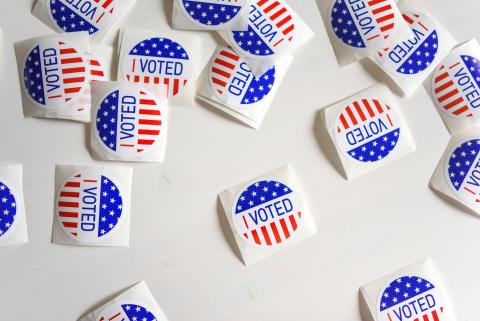In an opinion piece published on Roll Call, David Winston, president of The Winston Group, asked one of the most important questions when considering the state of US elections ahead of another presidential nomination cycle.
He writes:
“With just a little over six weeks until the 2024 Iowa caucuses, rumblings about possible third-party or independent entrants into the presidential sweepstakes continue to swirl around Washington. Most of the speculation zeroes in on whether there is still room for a successful third-party or independent candidate this year.
It’s a good question but not quite the right question the two parties should be asking themselves.
What they should be asking is this: What has gone so wrong with the two-party nominating process that voters are again facing yet another election in which the parties are producing candidates they don’t like?”
He’s right about two things. The first question isn’t one that the parties care to consider, because to them there will never be room for an independent or third-party candidate. They have rigged the election rules to prevent outside competition.
Every election cycle, party leaders and the rank-and-file of their membership say, “Now is not the time to vote for an independent or third-party candidate.” How many times did voters hear this verbatim in 2000, 2004, 2008, 2012, 2016, and 2020?
I’m going to rip this bandage off right now: They will never change their tune. In fact, the rhetoric against outside competition has only escalated because of how deeply entrenched party members have become in the zero-sum contest against the “other side.”
All that matters to them is winning, and in order to do that they will tell voters that if they vote for anyone outside the Republican and Democratic Parties it is really a vote for the candidate of the opposing party.
If a voter decides to vote their true preference, shame on them! How dare they want a system they are told is democratic to actually be democratic!
But this feeds into what Winston calls the “right question”: What has gone wrong with the partisan nomination process that voters feel like they are left with two underwhelming and unfavorable options?
The answer lies with the process itself. It’s a process in which the parties have erected a sign that says, “For Party Members Only,” despite being publicly funded and administered. It is a process that divides people between “Team Red” and “Team Blue.”
It is a process in which party leaders have said on national television that their rules are designed to put their private interests above the interests of voters – and if they choose, they can ignore the will of primary and caucus voters to get the outcome they want.
It is a process in which the stakes for victory have no ceiling. Republicans and Democrats view each other as enemies out to destroy the country. And there are no lengths considered out of bounds in their pursuit of victory.
The ever-escalating toxicity and spiteful rhetoric on and off the campaign trail pushes the parties’ shrinking bases further apart, which in turn leads to more polarizing and generally unfavorable candidates being nominated because of who these candidates are held accountable.
It is a process in which voting and election reforms are only appealing to party leaders if they see benefit for themselves. It doesn’t matter how it empowers voters, enhances their participation, or makes them feel about their choices.
This is what it means when nonpartisan, pro-voter election reformers call it a "duopoly" – because every cog in the machine is controlled or otherwise dictated and directed by the Republican and Democratic Parties.
And this is why voters are fed up.
Each election cycle voters are polled on how they feel about adding competition to election, and in every cycle the overwhelming response is they feel neither party represents them, they don’t like the choices they’re given, and they want at least a third person on the debate stage.
Nothing is different ahead of the 2024 cycle. Winston mentions in his op-ed a recent Economist/YouGov that showed only 18% of independents favored President Biden’s re-election, while 65% opposed it. Sixty-one percent opposed former President Trump’s election.
These are numbers both parties should look at carefully because half of US voters are registered or self-identify as independent of any political party, and these voters will decide the 2024 general election.
There is a substantial majority of independents who oppose the election of either major party candidate. And yet, the DNC refused to acknowledge the two primary challengers to the incumbent president and the RNC is practically treating Trump like he already is the nominee.
The Economist/YouGov isn’t the only poll that should sound alarm bells for the major parties. Another survey found that Robert F. Kennedy Jr’s current favorability in a three-way race is at 22%.
This isn’t just enough to enhance competition in a presidential election; it is enough to put Kennedy on the debate stage if the numbers remain above 15%. That is, if the Commission on Presidential Debates sticks to its rules.
“There’s no denying that voters want other choices in 2024, just as they did in 2016 and 2020,” writes Winston. “But neither party is delivering, and voter dissatisfaction is becoming more and more evident as people migrate to ‘independent’ status. “
Based on the polling numbers we have seen, the 2024 presidential election cycle has the potential to shake the duopoly to its core. Voters increasingly don’t just want change, they demand it – and they deserve it.
